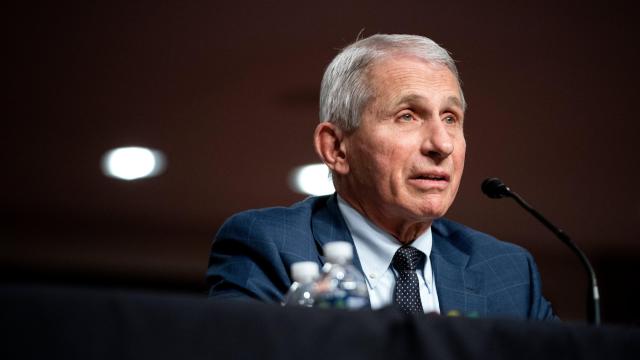America’s most prominent public health expert, Anthony Fauci, appears to no longer consider COVID-19 a pandemic, at least stateside. In an interview with PBS NewsHour this week, Fauci declared the “pandemic phase” of COVID-19 over in the U.S., citing currently low case, hospitalisation, and death counts. Notably, though, other White House health officials have said otherwise recently, while global figures continue to remain high and reported cases have begun to climb again in the U.S.
PBS NewsHour asked Fauci, the White House’s chief medical advisor, how close we are to the end of the pandemic. He first responded that the question was unanswerable, then went on to state: “We are certainly right now in this country out of the pandemic phase. Namely, we don’t have 900,000 new infections a day and tens and tens and tens of thousands of hospitalizations and thousands of deaths. We are at a low level right now.”
The country is an ebb currently when it comes to COVID-19, following the largest wave of the pandemic earlier this winter. According to BNO’s tracker, there were about 60,000 cases reported Tuesday, along with just under 15,000 hospitalizations and 400 deaths — some of the lowest numbers we’ve seen in the U.S. since covid-19 emerged globally in early 2020.
However, these numbers may not be reliable, as we may be underestimating cases to a significant extent. Many states have scaled back their data reporting, for instance, while at-home rapid tests are not included in these counts at all. People also seem to be testing themselves less frequently, and the loss of federal funding has eroded the availability of free testing for people without insurance. Even with these limitations, though, reported cases have taken a slight uptick in recent weeks.
Not all of Fauci’s colleagues seem to agree with his assessment. During an interview with Good Morning America two weeks ago, Ashish Jha — the newly appointed White House coronavirus response coordinator — stated that the pandemic wasn’t over, citing the recent large outbreak of cases tied to a prominent dinner event held at the Gridiron Club in Washington D.C. And the 81-year-old Fauci himself appears wary of encountering a similar scenario. Just today, White House officials confirmed that Fauci will not be attending the White House Correspondents’ Association dinner this Saturday, due to an “individual assessment” of his personal risk.
Thankfully, the COVID-19 situation in the U.S. is different now than it was a year or two ago. Most Americans are vaccinated, and the vaccines continue to provide highly effective protection against severe illness and death. Just this week, the CDC released new data suggesting that 60% of Americans have antibodies to the virus in their blood, a percentage that might have especially risen due to the Omicron surge this winter. Our collective immunity has and will blunt the impact of future covid-19 cases. The promised greater availability of antiviral medications like Paxlovid might further make COVID-19 less of an urgent health concern.
But Fauci’s comments do highlight an issue that cropped up at the very beginning of all this — that there isn’t an official arbiter of what makes a pandemic a pandemic. The World Health Organisation infamously dragged its feet in referring to covid-19 as a pandemic, though it had already declared the situation a Public Health Emergency of International Concern (PHEIC) beforehand.
The WHO’s alert hasn’t ended, by the way, nor has the local version issued by the U.S. government. Globally, COVID-19 cases are still at very high levels, though reported deaths are relatively low currently. Fauci acknowledged this reality at the end of his interview, saying that “if you look at the global situation, there’s no doubt this pandemic is still ongoing.”
The dictionary definition of a pandemic is a global, widespread epidemic of a disease, and the novelty of that disease plays an important role there. COVID-19 originally spread so easily and caused so much trouble because our bodies had never encountered it before. As the world has gotten more exposed to the virus, through vaccination and infection, it’s become less able to cause severe illness and large outbreaks. However, the virus has adapted to us, too, resulting in more transmissible and sometimes deadlier variants that have learned to dodge some of our immunity.
Experts have told Gizmodo before that COVID-19 should no longer be considered a pandemic when it stops being the major health crisis that it has been so far — when it can be managed like other typical respiratory infections. We’re certainly closer to that goal in the U.S. than ever before, though other, more highly vaccinated countries are even closer. But until the dust settles and we’re consistently seeing low levels of illness and death for more than a few months, perhaps interrupted by seasonal outbreaks (much like the flu), we probably shouldn’t get too cocky and declare the pandemic over, even on a local level.
After all, it was only early last year that many people basically said the same thing that Fauci is saying now — yours truly included.
